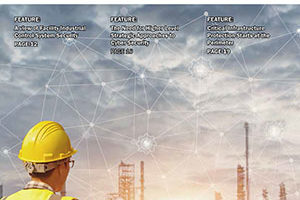IACIPP Concerned at Increasing Ransomware Attacks Against Critical Infrastructure
The International Association of CIP Professionals (IACIPP) is concerned about the increasing threat and ransomware attacks against critical infrastructure and in particular the energy sector.
As has been demonstrated by the recent ransomware attack on Colonial Pipeline in North America, and the impact this has had across other infrastructure services, and the wider economic impact on, for example, the price of petrol and oil, such attacks should be a concern to us all.
"The attack on the Colonial Pipeline Industrial Control System was not a total surprise. For years, our pipeline infrastructure and other critical infrastructures have experienced an ever-increasing level of probes and attacks. The ICS owners and operators must be vigilant and assure their systems are continuously monitored and armed with the latest cyber protection tools." Commented Dr. Ron Martin, CPP, Professor of Practice: Critical Infrastructure, Industrial Control System Security, and Access and Identity Management at Capitol Technology University.
Although the FBI and other federal and private cybersecurity entities are working to mitigate the effects of the attack on Colonial Pipeline, there needs to be the wider discussion and collaboration across industry sectors to prepare for future attacks to mitigate future economic impact such attacks cause.
“Our critical infrastructure sectors are the modern day battlefield and cyber space is the great equalizer. Hacker groups can essentially attack with little individual attribution and virtually no consequence. With over 85% of all infrastructure owned and operated by the private sector, significant investment and attention must be placed on hardening key critical systems. I anticipate more attacks like this happening in the future. A key lesson here is that while technology and automation is good, we must also have the ability to efficiently operate manually as well. Attacks will happen, but how quick can you recover and restore critical services?” commented Brian Harrell, Strategic Adviser to IACIPP and Former Assistant Secretary for Infrastructure Protection.
CISA and the Federal Bureau of Investigation (FBI) have recently released a Joint Cybersecurity Advisory (CSA) on a ransomware-as-a-service (RaaS) variant—referred to as DarkSide—recently used in a ransomware attack against Colonial Pipeline.
Chuck Brooks, President of Brooks Consulting International and cyber expert, commented, “Protecting critical infrastructure needs to be a shared responsibility of both the public and private sectors. The energy sector become a preferred target of sophisticated hackers often in collusion with nation state actors. The cost of breach as evidenced in the Colonial pipeline ransomware attack can be disruptive to commerce and impact many industry verticals. “
“Critical infrastructure needs to be fortified from cyberattacks and physical attacks in a joint government/industry collaboration. Resources need to be invested in emerging automation technologies and training. IT and OT systems need to be monitored at the sensor level for anomalies. Sensitive operations need to be segmented and air gapped. Back up of data is an imperative and resiliency a requirement for all critical infrastructure operations. It may take new laws and regulations, but it needs to be done.” Concluded Mr Brooks.
The cyberattack against Colonial Pipeline that was discovered on May 7 underscores the growing impact of cyberthreats on industrial sectors. While the investigation is ongoing and important lessons from this attack will be extracted in the next few weeks, the fact that Colonial Pipeline had to pro-actively take their OT systems offline after starting to learn about which IT systems were impacted by the ransomware is significant.
John Donlon QPM the Chairman of IACIPP stated - ‘This type of attack comes as no real surprise. It is consistent with recent trends and what is really quite concerning is the fact that the scale and impact of such events continue to escalate. We have seen recent Government activity across the Western world seeking to put in place support to Infrastructure Owners and Operators but the speed of new attack methodologies, either through nation-state actors or criminal groups, means it is not always easy to keep ahead of the curve. Unfortunately, I believe we will continue to see even greater escalation in the power of attacks being executed and therefore the breadth and depth of collaboration between governments and the private sector has to develop at pace’.
This will also be subject to a case study panel discussion at Critical Infrastructure Protection and Resilience North America (www.ciprna-expo.com) in New Orleans LA on 19th - 21st of October 2021.



